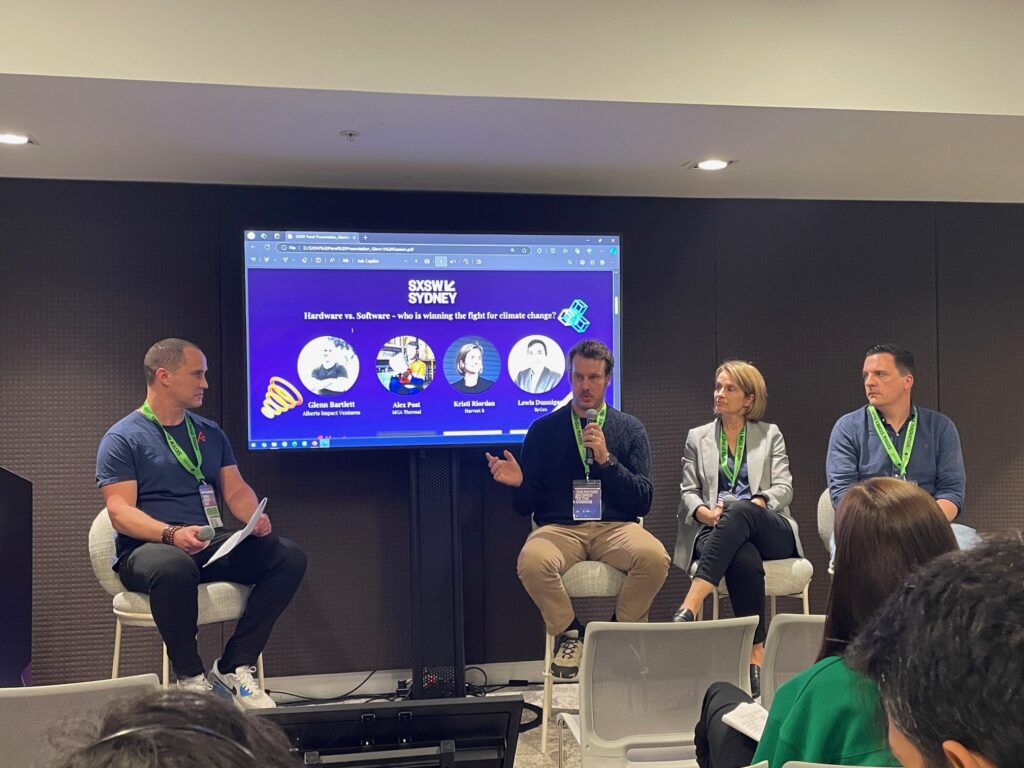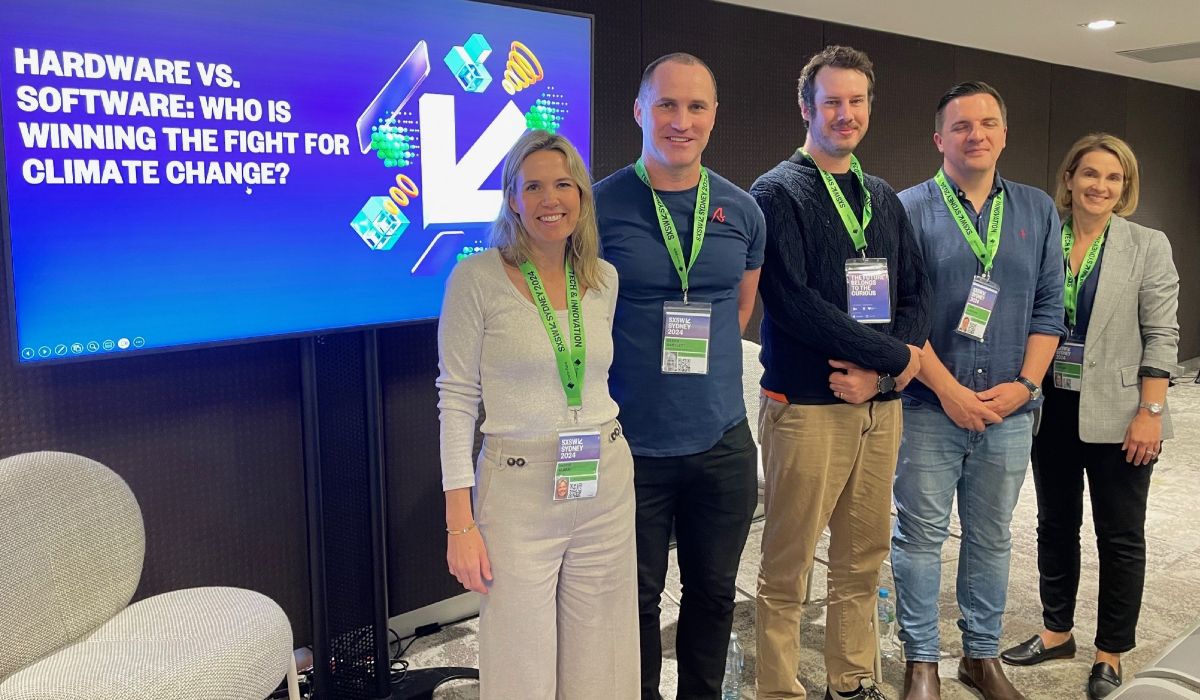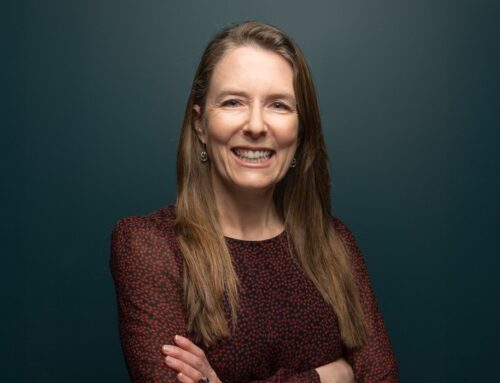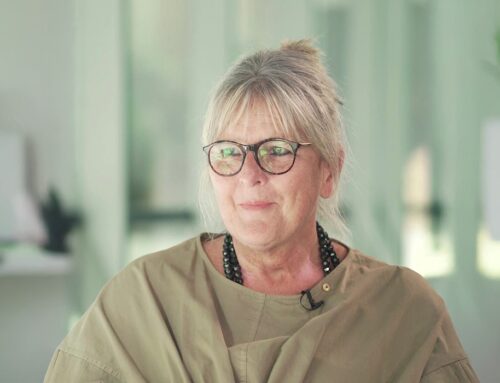At SXSW Sydney this week, Alberts brought together a panel of our brightest climate-focussed minds designing real-world climate solutions to debate what’s really needed
‘Nature is not scenery. It’s not the backdrop to our lives, it’s actually the intricate web that sustains us. And as it’s not scenery, saving it is not a spectator sport.’
This comment was made at the recent Global Nature Positive Summit and referenced by Alberts head of strategy, Glenn Bartlett, at the second SXSW conference in Sydney. This year’s SXSW Sydney theme is ‘The future belongs to the curious’, but Glenn took it one step further: “I’d argue the future belongs to those who are super-focussed so get out of this over-stimulating environment that we’re in and focus on what’s really needed.”
Glenn was of course talking about the environment and the urgent need to address the dire state of the planet. Thankfully, some of Australia’s sharpest minds are doing just that, and three of them came together on a panel at SXSW to work through the pressing topic: ‘Hardware vs Software: Who is winning the fight for climate change?’
Joining the panel were Kristi Riordan, CEO and co-founder of Harvest B, a food tech business that develops and manufactures delicious, sustainable proteins for everyday meals that nourish people and the planet; Lewis Dunnigan, co-founder and CEO of climate tech company Bygen; and Dr Alexander Post, co-founder and CTO of renewable energy storage solutions company MGA Thermal.

(From left): Glenn Bartlett, Dr Alexander Post, Kristi Riordan and Lewis Dunnigan.
All of them portfolio companies with Alberts Impact Ventures, they are all co-founders of businesses looking to make profound changes to address our rapidly deteriorating environment.
Speaking before a room of investors, founders, podcasters and changemakers, the group agreed that early investment in hardware was crucial. They also pointed out the deeply complex hardware they are developing and constantly refining requires long-term, patient investment from VCs.
“As an investor you have to think about epochs,” says Kristi, whose Harvest B co-founder Alfred Lo is a former venture investor. “An epoch is a decade of huge opportunity … All this hardware real world environment is an epoch, because if we don’t figure it out we’re not going to have a planet left in a decade. So, there’s an enormous amount of opportunity … and if you’re too afraid to jump in, take the risks that are associated with hardware … you’re going to miss the epoch and miss the opportunity for return.”
Nevertheless, rather than seeing it as ‘hardware vs software’, the group agreed it was in fact important the two work hand in hand to bring about innovative solutions to climate change.
“Hardware makes a great moat around your technology,” says Alex, whose startup, MGA Thermal, is a revolutionary clean-energy company that has designed a breakthrough form of energy storage that ensures renewable energy can be available 24/7, even during peak loads.
“Our pilot scale project, which is storing 5 megawatt hours is saving around 3000 tonnes of CO2 emissions per year of operation … the full application is in the order of 100 times that, so the potential is [to save] millions and millions of tonnes of CO2.”
Lewis points out that, without software, the hardware that drives Bygen’s product would not exist today.
“Fundamentally, our plants cannot run without software unless you want to employ 100 people turning tiny little dials every few seconds. It maximises the quality of the product, is essential for health and safety with the processing equipment so we absolutely need to employ it in our business.”
As it stands, Bygen is commercialising technology that enables the manufacturing of activated carbon more cheaply and more sustainably than conventional ways. Given the role activated carbon plays in stripping and absorbing contaminates from water, soils and gases, resulting in vital clean air, water and soil, both hardware and software are indispensable.
Despite the time, patience, inevitable mistakes and constant pivots and tweaks being made by the teams behind Bygen, MGA Thermal and Harvest B, the tangible results they are getting in addressing some of the climate’s most pressing needs are undeniably positive.
“The sense of reward from the growth journey in a hardware company is phenomenal,” says Alex. “Seeing the [thermal energy bricks] rolling off the production line is immensely rewarding. As a founder, it’s an incredibly humbling journey.”






